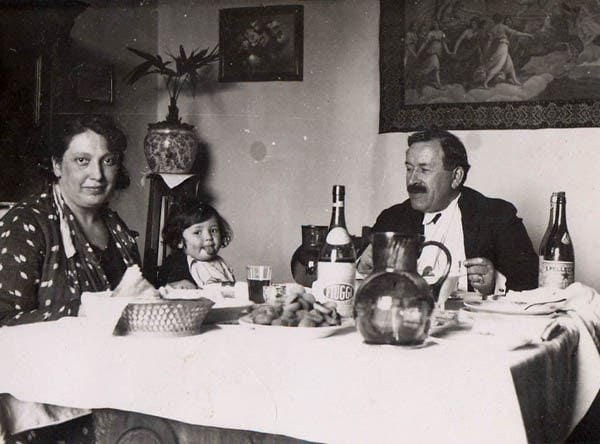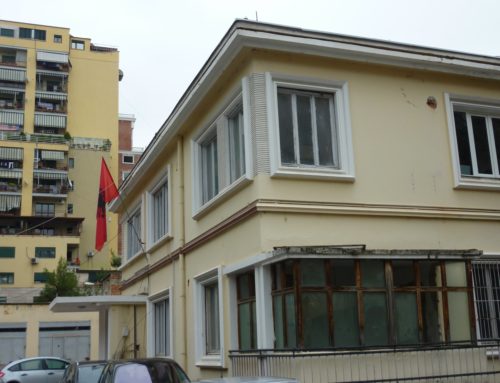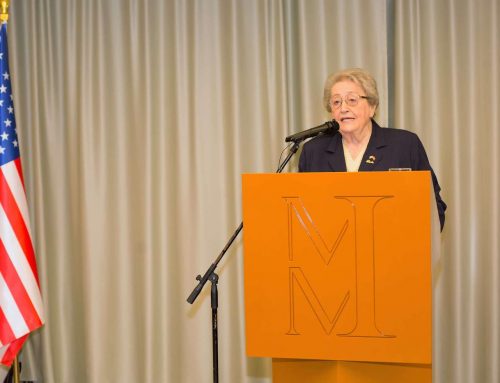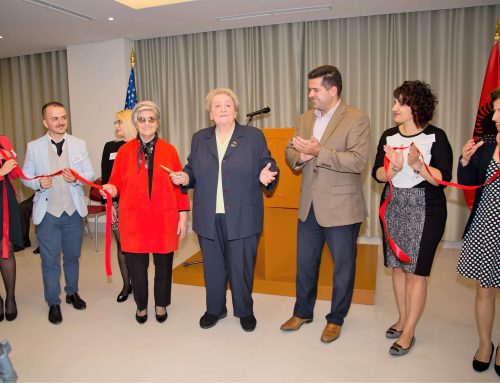By Pertefe Leka (source: Gazeta DIELLI)
An everlasting marital bond of Prof.Giuseppina Pogliotti with Albanian lawyer, Dr. Martin Ivanaj
The marriage of an Albanian young man with a foreign girl and vice versa was not a coincidence. History has shown that there have been many marriages at high levels of society, to create new friendships, to make alliances, to ensure peace or protection. In newer times the concept of marriage has changed based on moral and legal equality, feelings of love, respect and understanding. Based on the principles of its function, the duties and obligations of couples are now combining thoughtful and spiritual connections. Such was the marriage of Dr. Martin Ivanaj with Prof. Giuseppina Pogliotti. Their union was a perfect combination.
‘Pina’ Pogliotti, was a young lady in a family with noble ancestry dating back to the 16th century. Her family and ancestors that lived and owned large real estate in Ghemme (NO), Italy, included doctors, lawyers, and even a Prelate. An acquired maternal great aunt of hers belonged to the Collins family in England. She was the owner of the Isle of Caprera and Lady-in-waiting to Queen Victoria in London during her lifetime.
The family tree of the Ivanajs is also documented since 1444. Martin’s father, Doda, had a rich history in the fight against the Ottoman occupation. The activity of the Ivanaj fighters extended later on to Martin’s uncle participation in the League of Prizren.
A priority of the Pogliotti family was school education of its three girls. All of them attended a well known Normal School for Women (‘Rosa Stampa’ College) in Vercelli, and went on to higher studies elsewhere. While the oldest daughter graduated from the University of Grenoble (and taught French all of her life in Novara), Giuseppina briefly taught young children, after graduation, but attended a variety of other studies in Turin where she taught night school for adults, while she was also employed as Executive Secretary of ‘Rosa & Patriarca’, then the top Fashion’s House in Italy (an unusual position for a female at that time).
When Giuseppina went to Rome for a competition test for shorthand’s systems, (because she was one of the first seven students of Prof. Vincenzo Cima, editor of “La Stampa” and inventor of its own system of shorthand), she met Dr. Martin Ivanaj.
The two Ivanaj brothers were students at “La Sapienza” of Rome and lived together in a house for rent, where Miss Pogliotti was also hosted. Unintentionally invited to dinner, there they were introduced and each other’s recognition escalated. What united them was mutual love, guided and directed towards each other.
Dr. Martin approached this woman who aligned herself with identity and personality, was educated and with a politeness that made the interpersonal relationship work and the continuity as a couple later on, even more dynamic.
Mrs. Ivanaj did not find it difficult to fit best in a new cohabitation, leaving Italy where the couple had all the opportunities to live there and work at high levels of employment, since both were educated in Italy. In this entire adaptation she had great ability to make the next step in recognizing, accepting and honoring her husband with confidence since they now belonged to one another.
Having the power of love, she turned to the other, without denying herself. Although coming from a country with a different language and culture, she accepted that challenge graciously, and the commitment to provide harmony in the family.
They decided to build their nest in Albania because the country needed more educated people, particularly in the field of justice for which Dr. Martin had defended his thesis of Jurisprudence at the University ‘La Sapienza’ of Rome.
Mrs. Ivanaj quite naturally adapted to the traditions and customs of the country, and soon came to speak the Albanian language.
At the home that the Ivanaj brothers, Martin and Mirash, built in Tirana, Mrs. Ivanaj lived in harmony with brother in law, Prof. Mirash, who never married after the death of his Roman girlfriend, whose family was a great fan and supporter of Giuseppe Mazzini (politician, journalist, revolutionary activist for the unification of Italy, anti-Marxist). Mirash Ivanaj chose to keep a strong connection with this maiden until the end of his life by preserving her braid in memory after her death (for information: after the death in prison of Prof.Mirash, the braid came out of the prison only after the 1990s when Dr. Lazër Radi, who had saved this trust as a fellow prisoner, handed Drita the few relics left by her uncle Mirash).
While Dr. Martin spent beautiful times with Prof. Pogliotti, he saw that the family adopt the Lady by saying: ‘You are the Queen of this house’. The environment where they lived together, was not just a shelter, it was a school, a cultural center where the most valuable thing was its library, which held over 16 thousand books. In house studies were designed by Dr. Martin (then President of the Court of Cassation) for two written codes: Penal and Civil code, while an Educational reform was designed by Prof. Mirash that still bears its name, as the ‘Ivanaj Reform of 1935’. Thus, we are dealing with two thinkers, scholars, professionals, and a lady with whom to discuss various problems because she, as they, were primed in many areas of knowledge.
Extra joy came to the family life with the birth of the daughter of Martin and Giuseppina, Drita, given that the name was illuminated by the Ivanaj family, century old, tribal tree. The lady in question, though of Italian origin, had no objection to the name, but spoke of it with satisfaction, knowing that the symbolism of the word (Drita = light) gave beautiful ‘light’ to the entire family.
She raised the family in Albania, in a society where patriarchal family existed, but the freedom of thoughts and attitudes in the family gave further impetus to the judgment that success in family life has preconditions to be so in the actions of social life. The most successful mechanism that moved the pole in her personality was the balance within herself and with others. So the new relationship with this woman opened new windows by employing her not only as a mother, but as an educator and an authentic teacher.
In a notebook devoted to her daughter, she wrote among other things:
The Golden key: “………when you yearn for something big, be it of material or spiritual nature, remember that one single key can unlock all doors, open every alcove, and cancel, as if by magic, every obstacle. That golden key is named FAITH!” Pina Pogliotti
Happiness in the Ivanaj family coexistence was busted by the fascist occupation of Albania, which the Ivanaj brothers could not ever adjust to, and they were ready to fight the occupiers. Organizational barriers to resistance from the government made the Ivanaj brothers emigrate and seek political asylum in Istanbul. Mrs. Ivanaj, who remained with 6 year old Drita to have her continue primary school in Tirana, initially resisted having to leave the house and Albania. When the fascists mercilessly sequestered her house and subjected her to physical threat, she was forced to go to Italy where she had parents, thinking that the family would be able to reunite itself soon again in Albania.
This lady, strong in character and with intelligence that rarely missed orientation, but with courage and faith, gathered key documentation possessed by the family, and in the noblest of gestures, when unable to get what remained, she folded the large size Albanian flag of the family, and put it in a safe place to take it away. I do not know of anyone among Albanian fugitives that have made such a move.
She never forgot the words of Prof. Mirash when he repeated a quote from Mazzini, whom he was a follower of: “Patriotism is a duty, and love for the fatherland is a divine mission”.
She knew how much pain was to leave the homeland, thus the brothers would not have left a flag considered a symbol of homeland and history that could be violated by the invaders. She zealously preserved that red fabric with the two-headed eagle with which she traveled to America, when she emigrated to it with Drita.
Drita could only attend less than one year of schooling in Albania, but after elementary school and gymnasium in Italy, she finished the Scientific Lyceum in 1951 with high scores. She dismissed what was thought of foreign Albanians when she completed two class levels in one school year, which brought the right to benefit scholarship in that country. However for the Italian mother, widowed after the death of her husband in Istanbul in 1940, responsibility increased twice as much for the daughter. Although she lived with her parents she could not put off Drita’s future.
Both mother and child, waving Albanian passports, had the opportunity to emigrate to the United States under the auspices of the United Nations.
Mrs. Ivanaj’s travel journal has remained untouched since December 1951 when aboard a US military transport ship through the waves of a raging ocean, it was carefully guarded with the Albanian passports and the national flag. With this precious relic, a symbol of resistance, Drita and her Mother joined their self-sacrifice in bracing themselves as part of this new community.
Meanwhile Mrs. Ivanaj did not severe ties with the brother-in-law, Prof. Mirash, when he returned home, and even while he was imprisoned, keeping him informed about the new developments of his beloved niece, Drita. She wrote many letters to the higher authorities of Italy regarding Prof. Mirash’s innocence, but Hoxha’s regime knew no justice, especially for those who were wise. She knew the strength of character of Prof. Mirash as a teacher, high school principal, Education Minister, and Head of the High Council of State, where his contribution was exemplary although he was against the monarchy. She was aware that he was serving his people that was in much need of help. This lady never lowered her pen to demand justice for the victimized brother in law.
Mrs. Ivanaj, in addition to her daily work in NY, was the Editor of a literary magazine and also wrote hundreds of biographies of successful Italian immigrants in America. After 8 years of continuous work, in January 1960, she died, leaving Drita suffering, but accustomed to continue life with optimism.
Drita kept her image in her mind and heart. Her mother inspired and continues to inspire her even today to live with dignity, systematically and demanding of herself. The message of her Mother: to be steadfast in the performance of duties, even in the service of others as missionaries, but without denying yourself, applies perfectly to her. It also recalls today the words that her mother wrote:
“I only envy who can ‘give’, not the ones who ‘have’ or ‘receive’. Who gives, procures a joy and gives him/herself a similar feeling of no less great value; also, effortlessly and with pleasure, he/she ensures him/herself with eternal happiness.” Pina Pogliotti ved.Ivanaj
Like no one, Drita has assimilated the foundations of current technology and should be able to give solutions to many problems, but one wonders when she says: I will consult my parents. Her willpower overcomes all barriers and this spells proficiency that was provided much from her mother’s advice. “When you long for something, do not ask God for ‘that thing’, but for FAITH; not a semblance of faith, but true faith. With it, you cannot make one conquest, but can conquer the whole world, be a lord on earth and bring yourself above it, stretch over time, without limitation in space and time, not only as a unit of knowledge and life, but gain power upon yourself and men!”
Drita spent many years at home, but without creating a vacuum in her spiritual, social and professional life, which she always progressed in. Her managerial and leading competence into information technology at Columbia University Computer Center made her appreciated and honored in that department and in social life.
Drita’s dream was to transmit her experience to Albanian youth, through the school system, but it was impossible to exercise such profession in Albania’s dictatorial system.
After years of waiting to return to Tirana, Drita was given the opportunity to touch Albanian soil after 54 years, when none of the relatives dear to her heart, were living anymore.
An invitation from the Gymnasium of Shkodra in 1993, to participate in the ceremony of decorating . Prof. Ivanaj as “Martyr of Democracy”, gave her wings to fly to Albania. It was touching when she stepped off the plane, bowing to her knees to kiss the mother earth. All hosts at the airport joined her cry; it was a very emotional moment announcing to the teary Albanians that the dictatorship would not return.
Drita’s coming in Tirana was not merely a visit to get satisfaction about her property. She came with a clear vision to put her entire intellectual potential at the service of the Nation.
Initially, she sought of bringing back from Turkey to the homeland the remains of her father, facing a very serious situation psychologically, half a century after being separated from him. She chose a common memorial for the two brothers, Martin and Mirash Ivanaj, with the epitaph: “United in life and death for the Fatherland”.
The determination to overcome all bureaucratic barriers made it more consistent to her legitimate demands. Just to get her home that was occupied by communists, a government cavalcade had to go through long, off and again, passes until it was finally realized.
At the house she decided to put the offices of the Martin and Mirash Ivanaj Foundation Institute, similar to a sister organization founded in New York. There, on the balcony of the house, Drita unveiled the Albanian flag that was safeguarded by her mother, Pina Pogliotti Ivanaj. There, the black and red flag ended the long journey, from Albania, to Italy, to the United States, and back to Albania.
Now in Tirana, the flag, symbol of the history of the Albanian people, waves free in front of the Ivanaj house, to show just a fraction of the painful history under the communist dictatorship.
[translation from original Albanian version of article by Pertefe Leka, published in Gazeta Dielli and Gazeta 55 in March 2016]
Tags: Pertefe Leka, rrugetimi me Flamurin shqiptar, Zonja Drita Ivanaj
– See more at: https://gazetadielli.com/rrugetimi-i-gjate-i-zonjes-ivanaj-me-flamurin-shqiptarnje-shembull-i-perkryer/#.dpuf






